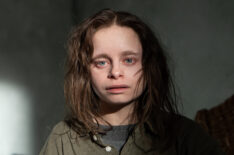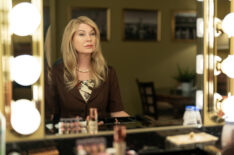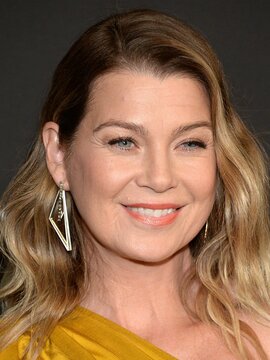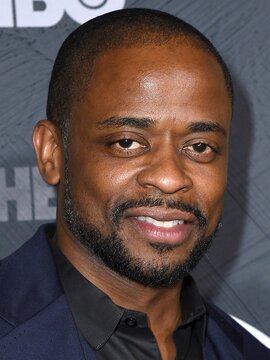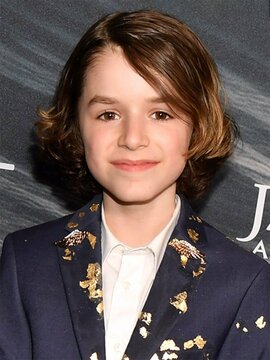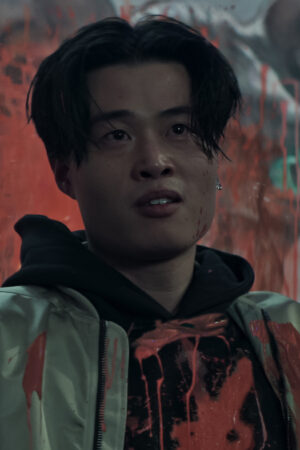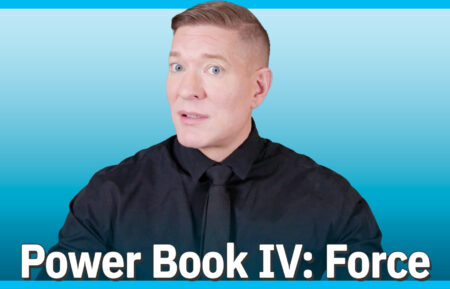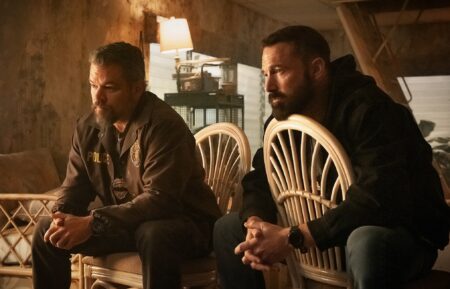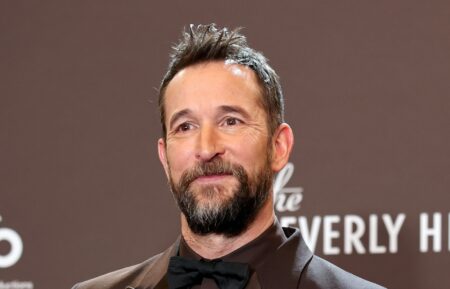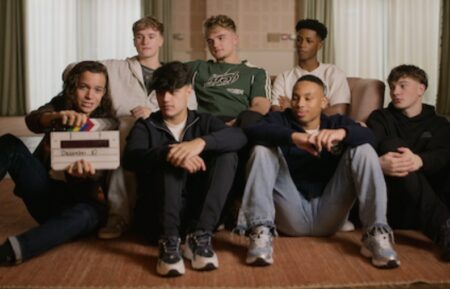‘Good American Family’: Christina Hendricks Reflects on Playing the Complex Savior for Natalia Grace
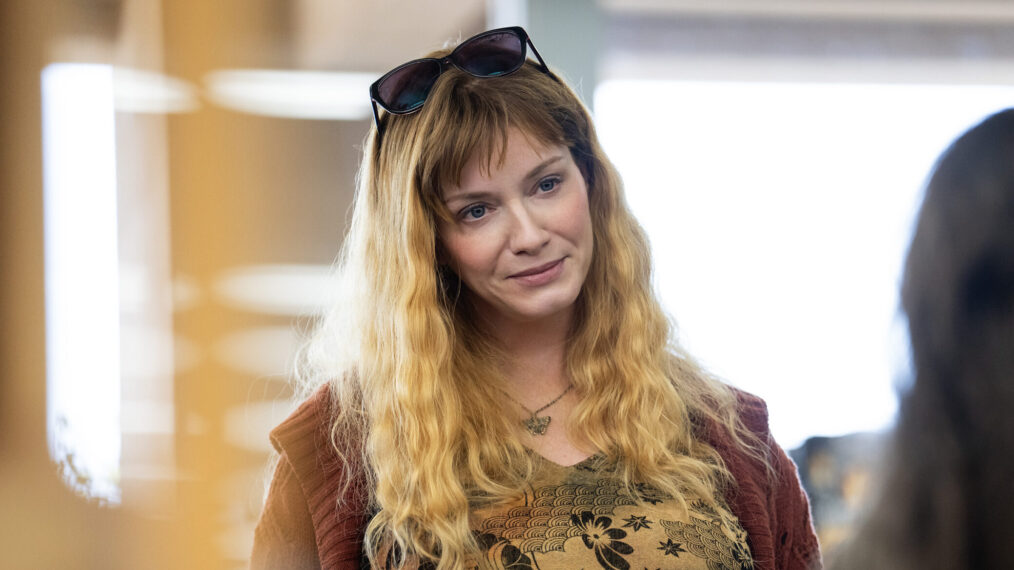
Exclusive
[Warning: The following post contains MAJOR spoilers for Good American Family Episode 6, “Not Today Satan.”]
Good American Family was filmed before the real-life Natalia Grace had such an abrupt departure from the life of Cynthia Mans, which was captured in The Curious Case of Natalia Grace: The Final Chapter. However, the show still presciently — albeit, subtly — raises a question about the true intention of the woman who appears to be a hero for the suffering child: Was she truly an angel who swooped in and saved the day for this girl out of the goodness of her heart, or did she have an ulterior financial motive for helping Natalia?
Episode 6 begins with Natalia (Imogen Faith Reid) struggling in the GED class Kristine (Ellen Pompeo) is forcing her to take so she can become financially independent of the Barnetts. In part, she falls behind because the assignment is for Natalia to write about herself, and Kristine has threatened her with violence and even further neglect if she doesn’t say what Kristine wants her to. There’s also the fact that she’s only 8 years old, so she should be in elementary school, not there. Worse, Natalia is essentially starving — we see her eating scraps from a dumpster and discover she hasn’t gone shopping in weeks — and she has to walk miles to and from school on severely blistered feet.
When Cynthia (Christina Hendricks) randomly drives up, she finds Natalia in obvious distress. Although Natalia is reluctant to accept help and claims to be an adult, per Kristine’s threats, Cynthia is persistent and clever in her conversations with Natalia. She pretends to accept her claim of adulthood, although she knows this is a kid in trouble — she even repeats Natalia’s innocent “cataclogs” mispronunciation without skipping a beat to help keep up the ruse. She talks Natalia into accepting a ride home and letting Cynthia in to see the squalid conditions she’s living in. So far, Cynthia’s behaviors are purely altruistic. However, when Cynthia takes Natalia grocery shopping, asks to use her EBT card, and then hauls all of the food to her own house, it’s confusing, especially once we find out her sprawling family has financial woes of their own. Later, Cynthia also takes Natalia to redirect her disability payments from Kristine’s home to her address.
“It’s very clever of them,” Christina Hendricks told TV Insider of those shadows of doubt about Cynthia’s character sprinkled throughout the episode. “[She] seems like a place of safety, a place of comfort, but then there’s these little moments where you go, ‘Wait a minute, that doesn’t seem quite right. Is she taking advantage of her? Is she true to her word?'”
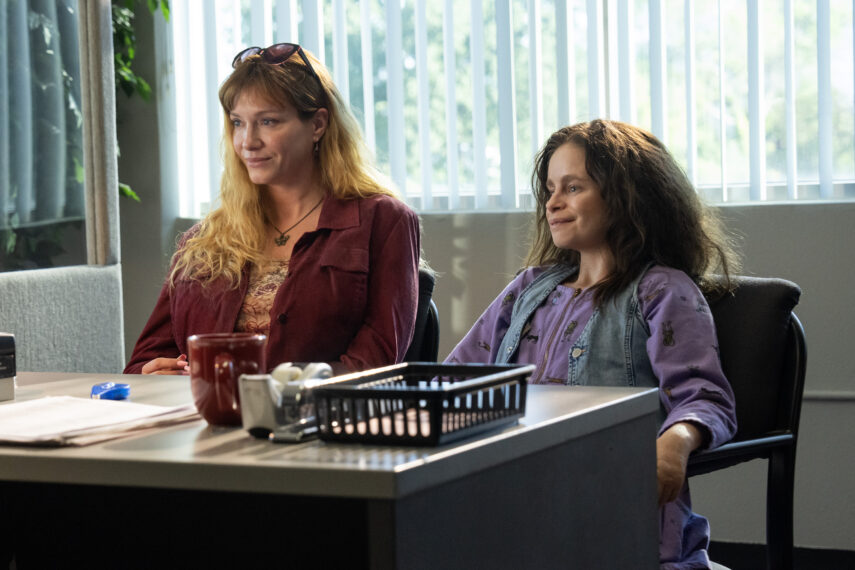
Still, Cynthia is the strident defender Natalia needs at this moment, demanding real help from a doctor, calling herself Natalia’s mother, and even dealing with Kristine’s incessant calls. She also immediately forgives Natalia for hitting her — something Natalia had also done to Kristine during a tantrum — and surrounds her with her own kids, along with warmth and understanding. By the end of the episode, Natalia is clean (she takes a bath for the first time in who knows how long, which is a sign of her trust in Cynthia), fed, and smiling. She’s even been assured that she is loved by a parental figure for the first time since Kristine and Michael (Mark Duplass) decided to abuse and abandon her.
To dig into the complexities of Cynthia and how her presence changes everything for Natalia Grace on Good American Family, TV Insider caught up with Christina Hendricks.
Everyone in this show has to pull double duty in a way, playing two sides of the same coin. With your character, we see that when there are some question marks on the edges of some of the things that she says or does or prioritizes. What was it like for you to play into those moments where you kind of have to wonder what her motivations are?
Christina Hendricks: I think it was really important to have those little moments because [I] come in at a time where we’re flipping perspectives, so it really needed to be a huge juxtaposition to what you were seeing from the Barnetts’ side. So, in order to do that, I needed to be a safe place, a loving place, a home that could take her in at a time when she had literally no people and nothing on her side. But that being said, this is not a black-and-white story by any means, and we have to show those moments of question and of Natalia’s questioning. She can’t just go from a place where she feels like she can’t trust anyone to just turning to a new person and trusting them 100%. That wouldn’t be realistic… So it was important to have these little questions pop up in the audience’s mind.
How much did the colorful costuming help you get into your character?
I think any actor would say costumes and hair and makeup do so much to just change how you feel as a person…. I had not a lot of time to prepare, but I had taken lots of screen grabs from the ID series of things that I was like, “This would be really interesting to use for Cynthia. I’ve noticed this about her…” I noticed that she never wore pants. I only saw her skirts. And I noticed that she liked to have fun with her clothing. And I was like, “Well, that’s interesting.” I think maybe she’s used to being around kids a lot, and she wants to be a fun person with kids. So she has this sort of joyful presentation of herself, to a certain extent, where she’s sort of relaxed and has fun and doesn’t think too much about it, but thinks about things she likes that make her smile. So when we went through wardrobe, that’s the kind of stuff we wanted to think about: Which stores would she have available to be shopping at, and what kind of pieces would she choose from those stores, and also a level of comfort, because I feel like there’s a lot of like cuddling children and hugging children. And so we wanted to take all those things into mind. But I also sort of wanted to change the way I walked because I feel like if you’re walking in those kinds of shoes or in those kinds of clothes [it’s distinct], so I sort of put on a different kind of walk and moved my hands differently, and I feel like it all just helped inform a sort of comfortability about her.
That also plays into the disposition that she has. She betrays a lot with her face but not her words. Can you talk about playing to that, especially when she’s going along with Natalia’s story but clearly knows better?
Yeah, I think it’s about having the knowledge that this is full well a child — and it needs to be very important that Cynthia thinks that because the Barnetts do not — but also showing her the amount of respect that like, “If this child is going to tell me she’s an adult, I’m gonna sit here and listen to her story and follow through.” So I wanted to be her friend, and I didn’t want to come across as being too motherly or too doting in the beginning because I wanted to be like, “I’m cool, we’re cool. I get it. Let’s be buddies.” So I really wanted to approach it like that, but with full well knowing that we had someone who had had some trauma in their life and needed nurturing but needed to be treated very sensitively.
That trauma that she senses comes to a head when they’re in the car, and Natalia hits Cynthia, and then later says that she’s not her mom. These are all things that kind of happened with Kristine, but Cynthia takes it with grace, even if it does seem to break her heart a little bit. Can you talk about playing that silent bit of devastation?
I think one thing that was a real key to me and a very important line in that moment is that she says, “Look what you made me do.” Natalia says that when she hits her, she goes, “Look what you made me do.” And I feel like that is a key phrase that abusers use. … That makes Cynthia clock something in her that either Cynthia’s experienced in her own life, or maybe some of the children that she’s taken in. But that phrase says something to her. That says, “Oh, this isn’t the first time this has happened, and she’s heard this phrasing before,” and I think it’s heartbreaking.
Another heartbreaking moment is when they go to the apartment, and she talks her way into it by having this air of nonchalance, but then when she goes in, she can’t help but drop it ’cause it’s pure horror. Can you talk about losing that air of cool?
That was actually the very first scene we shot together. That was my very first scene on the show, so I was terrified. I had just gotten cast, and I had just gotten there, and I was trying out a new accent in front of everyone and wasn’t sure how it was gonna fly, and I hadn’t had a chance to work with a dialect coach yet. So I was trembling in my boots in general. So I was sort of in survival mode as just as far as like, “Let’s get into set mode and do what you do.” Imogen was so welcoming and so easy to be around, so immediately I just followed her lead, and I looked at this vulnerable person in this excruciatingly sad space. And as long as I knew my lines, I could sort of follow her lead.
I think that you want to make sure — ’cause we’ve seen them in the car together, and then they show up at this apartment — you wanna see signs that Cynthia is truly concerned and really wants to help her. Otherwise, that moment when we get into the grocery store where she has to use her card… We need to have that different level. We have to trust her and then we have to question her. And I think in that scene, I wanted the audience to see through my eyes how dire the situation was. And then also to have at the end, Cynthia picks up with a joke, like, “Hey, I need your help. You come help me cook for my family,” and try to befriend her again. So it was a little bit of an emotional roller coaster and kind of an intense scene to start with — but in some ways, a great scene to start with because it just sort of established a lot of stuff between the two very quickly.
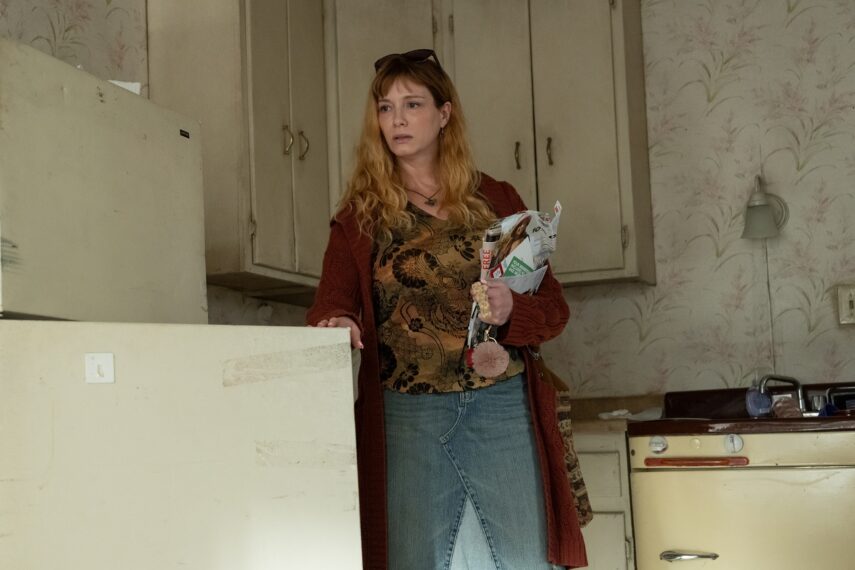
Disney / Ser Baffo
Then, there’s the big contrast of her bringing her to her home where it’s full of life and chaos and kids and love. Can you talk about drawing that contrast where you’re bringing her into this situation, but you’re still treating her carefully?
Absolutely, that’s actually one of my favorite scenes because I love the energy of it, and I love the difference between the Barnetts’ [house] — where when you go home to the Barnetts, the children are sort of super studious and a and a little bit uncomfortable and worried that they might be in trouble — to this, there’s sort of a rigidity there to this moment where everyone’s being creative and there’s multiple children playing together and being respectful of one another and joking… There was this constant movement and energy with the family, and I wanted her to feel immediately at home, like, “Come on in, grab a bag, help out,” but also clocking how she’s reacting to each child to see what her needs were. Because, then, Cynthia immediately goes — after one of the children goes in to give Natalia a hug — she goes, “You know what? We’re not gonna hug today. We’re just gonna do high fives.” Because she sees Natalia Flinch. So I think it’s like this great introduction of how she is with her children, that she is constantly aware of their needs, watching them, making sure everyone is sort of in this seamless sort of troop of players.
Speaking of energy, there are two great scenes where Cynthia really puts her foot down and becomes like the mama bear advocate for Natalia: in the doctor’s office and when Kristine calls. The thing that struck me about both of those is the way the series is constructed, we see things with a tinge of perspective. Are you playing to that, that this is how Natalia sees it?
I mean, the script did that in itself. They made sure that the beginning of the show and the ending of the show were going to be very specific and well-drawn out so that the intention and the point of view would be very obvious. I think that if you played it with too much ambiguity, then the point of flipping sides would get lost a little bit. So to me, it was about being very true to what was on the page. However, she’s coming across as very protective of Natalia, but I think she’s also protective of Cynthia. I think when she’s in that doctor’s office, she doesn’t like being judged. She doesn’t like being [asked], “Oh, you’re here for drugs?” Like, “How dare you.” So even though it’s about protecting her daughter, I think that when she gets challenged, she gets tough. And I think it’s a little bit more, it’s not all selfless.
And there’s also the very thinly veiled threat that the detective brings when it comes to the other daughter that they’re taking care of. She kind of retreats into a corner there, too, right?
Exactly. And I think that those moments show that this is not her first rodeo. This is not the first time she’s gone into a hospital with a child that maybe was not her own. And maybe not the first time she’s dealt with the police or authorities. And so all of those little things are things that Natalia would be confused about. So I think not only is it for the audience to go, “Whoa, wait, is this woman for real or is she not?” But Natalia’s got to be wondering those things.
So the last scene of this episode when Natalia panics and runs away is at once shattering and uplifting. Can you talk about crafting that exchange where she’s trying to make her understand that she can experience love and be loved?
Yeah, we spent a lot of time on that scene, and there was a lot of choreography in that scene, oddly enough. It was about sort of running and sitting on these rocks and not falling, the juice and spraying her in the face, and there’s a lot of technical stuff that hopefully the audience won’t even notice. It’ll just disappear. But there was a lot to think about in all of that scene. But I also think we wanted to make sure that it didn’t get saccharine… There’s still a toughness to Cynthia where she’s gonna turn a little bit of it into a joke. She’s gonna make it playful. She’s gonna make it fun. ‘Cause that’s how she knows to get kids to feel comfortable but where she’s also saying, “Hey, slow down. I’ve got your back for real. This is for real. So slow down and listen to my words.” But I certainly wanted to do that in a way that hit her heart and that she would take as earnest but that didn’t come across as sort of after school especially and too cloying in a way.
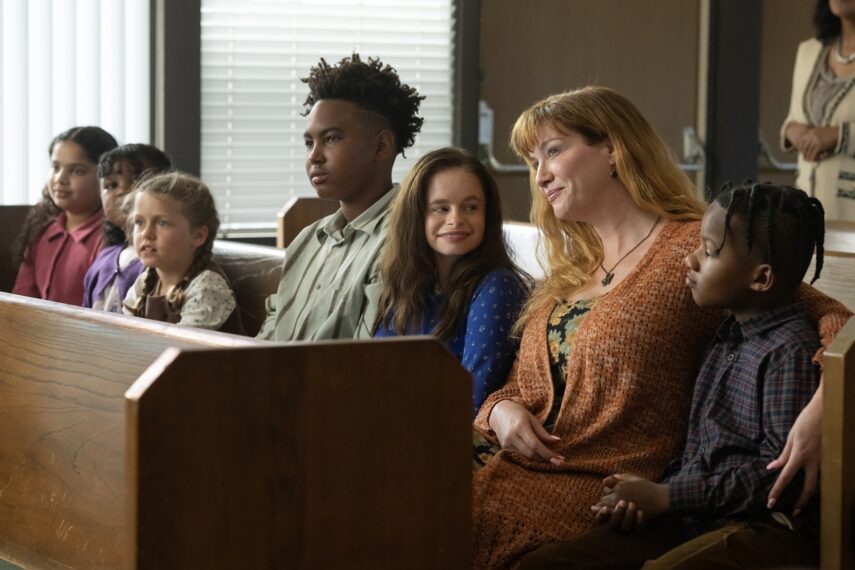
Disney / Ser Baffo
The effect of that is that she’s very honest regarding what Kristine has said on the phone. Does that play back to that respect thing where she’s giving her the information straight-up?
Yeah, I mean, we talked about that moment. I was like, “Wow, this is harsh.” But this child is saying she’s an adult. I can tell that she’s not, but I can also tell that she’s been through a lot more than a child should have to have gone through, and I think there is a sort of treating her a little bit more like an adult than she is there because I do think it’s a respect thing. And I think that she also is like, “You might have a battle ahead of you, and you need to be armed with all the facts.” I’m gonna be sensitive to them, but to protect you from all the facts would be leaving you in the dark, and that could be more dangerous.
You came in for Episode 6, but did you watch the first five, and if so what was your reaction to seeing Imogen in her first role accomplishing so much?
I have watched all of it, and I have to say, I knew she was great when we were working together. And I thought, “Oh my God, this, this woman is like in every scene, every day for months and months and months, and this is her first show, and she’s got so many pages of lines every day.” And I was already impressed. But then when I went back and watched the show, I realized how dramatically different she played the same character… ‘Cause I didn’t get to be there for any of that. So when I saw what she did and the difference, I was even more impressed because I thought that is a hard job for anyone, any actor who’s had tons of experience, to do, but to come in for your first role and be able to show all those different sides, it was super impressive. I’m so happy for her.
Good American Family, Wednesdays, Hulu
If you or someone you know is the victim of child abuse, contact the Childhelp National Child Abuse Hotline at 1-800-4-A-Child (1-800-422-4453). If you or a loved one are in immediate danger, call 911.

